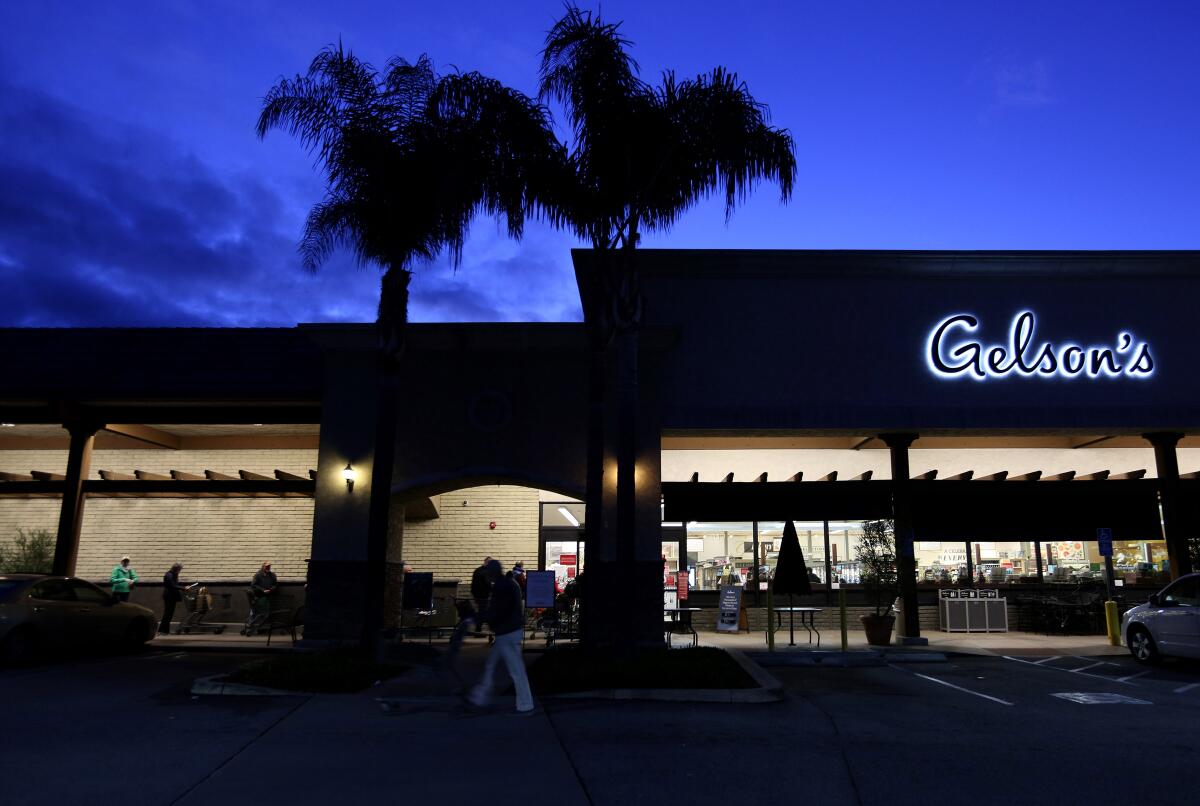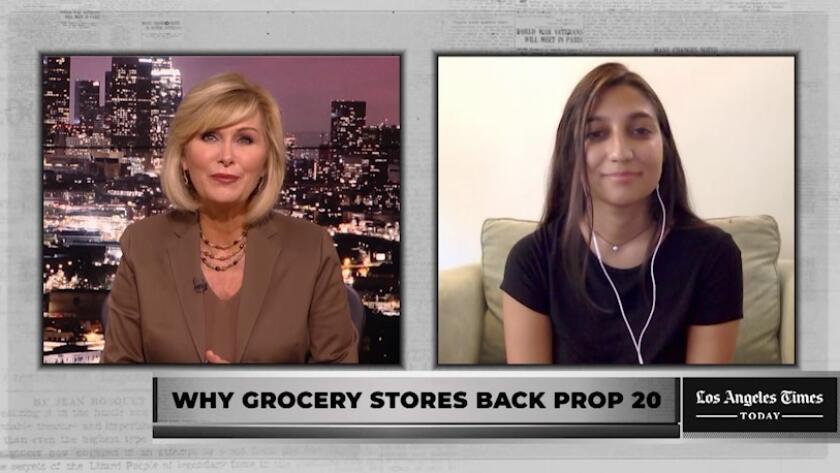Grocery stores are pushing California to be tougher on crime. Here’s why

- Share via
In 2003, Brian Beinlich stood before a judge in an Orange County courtroom, barely comprehending what had happened.
The judge had just told Beinlich he was sentenced to three consecutive life sentences in prison. He would not be eligible for parole for 81 years. His crime? Stealing two bottles of Hennessy from a Costco in Fountain Valley and waving a box cutter at the security guards who chased him down.
A wave of criminal justice reforms in California in recent years sought to ease thousands of harsh sentences like the one Beinlich received, reduce the state’s bloated prison populations and create more opportunities for parole and rehabilitation. But if several large grocery store chains have their way, a measure on the ballot this fall will roll back some of these reforms, increasing penalties for shoplifting and making it harder for those convicted of certain nonviolent property and drug crimes to get early parole.
While Proposition 20 was launched and financed primarily by law enforcement groups, grocery outlets served as early partners in the effort. They are taking a controversial stance at a sensitive time for corporate America, when companies of every stripe have taken pains to demonstrate support for the Black Lives Matter movement and its goals of tearing down racist systems of policing and mass incarceration.
Albertsons and Kroger — the grocers with the biggest financial contributions to Proposition 20 — and the California Grocers Assn. said in statements that they supported the measure because shoplifting and organized retail crime have been on the rise, amounting to significant losses and threatening the safety of employees and customers. They say that previous reforms went too far in removing teeth from laws meant to address this type of crime.
“People are stealing, and there are no consequences,” said Richard Temple, a spokesman for the Yes on Prop. 20 campaign.
Experts said theft is a big problem for retailers, especially for grocery stores, which have high foot traffic. A 2020 survey by the National Retail Federation found that theft — which the industry calls “shrink” — was at an all-time high, costing the industry $61.7 billion in fiscal year 2019, or 1.62% of retailers’ profits. A whole niche industry around battling retail theft, through cameras, locked display cases and undercover security guards, has sprung up.
The landscape of shoplifting and petty theft jurisprudence in California has shifted dramatically in recent years, largely due to Proposition 47, which voters approved in 2014. That measure raised the bar for grand theft and downgraded the classification of most shoplifting crimes to a misdemeanor. Whereas before, property theft of above $450 could be charged as a felony, now that threshold is $950. Proposition 57, approved two years later, hastened the release of some nonviolent offenders from prisons.
But after it was implemented, retailers and law enforcement officials blamed Proposition 47 for a spike in shoplifting; they said organized retail theft rings were taking advantage of reduced penalties. Safeway, Target, Rite Aid and CVS pharmacies said in 2016 that shoplifting had increased at least 15%. (Though experts say there is not sufficient evidence linking an increase in theft to the measure.)
L.A. County prosecutors, police union political action committees and other law enforcement groups — joined by grocers — launched a campaign in early 2018 to collect signatures for the ballot initiative that would undo some reforms. Although the initiative failed to secure a spot to go before voters in 2018, it later acquired enough signatures to make the 2020 ballot.
In 2018, major grocery chains Safeway and Ralphs contributed $100,000 and $91,800, respectively, to the campaign. Regional chains including upscale Bristol Farms, Southern California-based Gelson’s, and Raley’s, a family-owned line in California and Nevada, donated about $30,000 total, according to campaign finance disclosures.
A number of smaller grocers made contributions as well. Mar Val Food Stores, with nine locations scattered across California, donated $600, and Super A Foods, which caters to Latino and Asian consumers in the Los Angeles area, donated $3,900.
At least one major company has since withdrawn its support. Costco, which donated $50,000 to the Yes on 20 campaign in early 2018, said in a statement it no longer supports the measure and that it previously requested a return of its contributions. (Costco spokeswoman Muriel Cooper declined to provide further details on when and why the company changed course.)
Dan Seeman, with the No on Prop. 20 campaign and a former public safety advisor to Gov. Gavin Newsom, said the changes proposed are unnecessary, given that law enforcement officials already possess an arsenal of tools to prosecute theft with greater penalties, if they so choose. Prosecutors could aggregate the value of multiple thefts and stack charges if they wanted to put someone in jail for several years, he said.
“We are not in an environment where you would imagine grocers’ top priority would be to lock people up, when essential workers are in danger every day from coronavirus,” Seeman said.
In 2018, to deter an attack on Proposition 47, legislators created “organized retail theft” as a new category of crime that would allow prosecutors to charge shoplifting as a felony if two or more people act together.
Temple, with the Yes on 20 campaign, said this rule places too high a burden on prosecutors to prove a conspiracy, and more harsh measures are needed.
Proposition 20 would allow thefts of property worth more than $250 to be punished as felonies, which could increase the amount of time people convicted of shoplifting crimes serve. It would also create two new crimes: serial theft and organized retail theft, which could also be charged as felonies and result in time of up to three years.
Proposition 20’s opponents have made efforts to connect grocers’ support of the measure to the broader national dialogue on racist policing. California Safety and Justice, a group that opposes the measure, called out Safeway and Ralphs in an ad in June. Over grainy Black Lives Matter protest footage, a narrator pilloried the grocers for supporting a law that would put more people behind bars and increase prison spending at the expense of investing in community programs. (The Yes on 20 campaign countered with an ad thanking the corporations for their support of crime victims.)
It’s unclear why grocery chains have been more active in their support than other types of retailers. While the California Retailers Assn. is listed as a member of the Yes on 20 coalition alongside California Grocers Assn., major retailers other than grocers do not seem to have made direct monetary contributions to the campaign, according to campaign finance disclosures. The retailers association said its president, Rachel Michelin, was out of town and unavailable to comment. Other major companies including Target declined to comment about their position on the measure.
Neil Saunders, an analyst at GlobalData Retail, said the high level of unionization among grocery workers has led to grocers taking a more active role in politics.
Legal and academic experts said that while grocers and other retailers’ concerns about organized retail crime are legitimate, on the whole, studies show reforms did not exacerbate public safety risks in California.
Two studies — one by UC Irvine criminologist Charis Kubrin and another by the Public Policy Institute of California — found no connection between Proposition 47 and increases in violent crime. However, both noted slight increases in larceny, particularly thefts from motor vehicles. Kubrin said she was not able to find sufficient evidence these increases were caused by Proposition 47, though there are “still some question marks” around its effect on theft that warrant further research.
“We went to assess: ‘Did we get a lot more crime? Did we get a lot more recidivism?’ And as best we can see, that did not happen. We didn’t get those spikes in crime rates people were afraid of,” said Mia Bird, an assistant adjunct professor at the Goldman School of Public Policy who worked on the Public Policy Institute of California’s study of the effects of Proposition 47.
Shoplifting cases are currently treated as low priority in the broader criminal justice system. Big retailers send letters with boilerplate legal language asking for restitution to be paid for their losses. The cases are usually settled on the first day with a mandated rehabilitation program, probation or community service.
That’s how it should be, said Ambrosio Rodriguez, a Los Angeles-based criminal defense attorney and former prosecutor. It’s true that organized retail crime rings have emerged in recent years as California has softened its laws, he said, but sending more people to prison is not the answer.
“Plenty of people spent decades in prison for simple shoplifting because they had a prior,” he said. “We made a decision as a state that nonviolent crimes were not going to be ones that were going to land people in prison. ... This proposition is tone-deaf in terms of where we are in reforming the criminal justice system.”
When Beinlich stole those two bottles of Cognac, he had been struggling with addiction after being prescribed painkillers for surgeries he underwent.
“It turned my life into a state of chaos,” he said.
He had prior offenses, having served time for a series of robberies in the early 1990s. Still, he did not expect to be put in prison for life.
After 18 years in prison, Beinlich is out. A judge recalled his sentence on the recommendation of the California Department of Corrections and Rehabilitation, granting a rare reprieve. Both of his parents died while he was behind bars. His sister died three months after he got out.
Now he’s sober, lives in a transitory facility, volunteers at a church and takes classes at L.A. Trade-Technical College. In August, he visited Redondo Beach, where he saw the ocean for the first time in decades.
- Share via
Watch L.A. Times Today at 7 p.m. on Spectrum News 1 on Channel 1 or live stream on the Spectrum News App. Palos Verdes Peninsula and Orange County viewers can watch on Cox Systems on channel 99.
Times staff writer Ryan Menezes contributed to this report.
More to Read
Inside the business of entertainment
The Wide Shot brings you news, analysis and insights on everything from streaming wars to production — and what it all means for the future.
You may occasionally receive promotional content from the Los Angeles Times.












